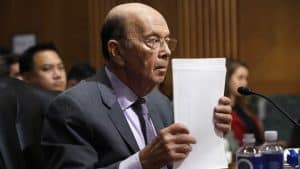
Chinese chip factory in Jinjiang, Fujian Province uses chip technology stolen from American company, Micron Technology (Paul Mazur/NYT)
Trade correspondent L.C. writes:
The Trump administration is continuing to escalate its trade pressures on China, but it’s not clear whether the priority is limiting technology transfer to China or improving the US trade balance with that country, nor why it is risking progress on either goal by simultaneously launching trade battles against allies and other non-Chinese countries.
Today’s Wall Street Journal reports that President Trump will announce by the end of this week “plans to ratchet commercial tensions higher by barring many Chinese companies from investing in U.S. technology firms, and by blocking additional technology exports to Beijing…The twin initiatives…are designed to prevent Beijing from moving ahead with plans outlined in its ‘Made in China 2025’ report to become a global leader in 10 broad areas of technology, including information technology, aerospace, electric vehicles and biotechnology.”
The latest developments come on top of a previous week of US threats against China’s existing trade and technology-grabbing policies. On June 18th, President Trump threatened to impose a 10% tariff on $200 billion in US imports from China, in addition to the 25% tariffs on $50 billion of Chinese products that were announced last week.
The new tariffs are not yet a done deal. They won’t be imposed until after a review by the US Trade Representative (USTR). Nor will last week’s 25% tariffs take effect until July 6th and then only on a first tranche.
Chinese retaliation is also scheduled to begin on July 6th.
There is little indication thus far that either President Trump or the Chinese will back down or offer a compromise that the other would accept.
Once again, global markets have taken notice of the rising chance of trade war. “Global stocks fell Monday, with the Dow Jones Industrial Average losing more than 400 points… Investors around the globe have been spooked by the prospect of a full-blown trade war between the U.S. and China. While the tariffs so far announced by the U.S. administration—and China’s retaliatory measures—amount only to a small number of goods, analysts fear that tensions could escalate and spread across other major economies,” today’s Wall Street Journal reports.
The Washington Post’s widely-followed economics columnist Robert Samuelson writes today that
“If we are to have a ‘trade war’ with China, it would be best to win it….Unfortunately, the chances of this happening seem slim to none, because President Trump’s plan of attack suggests that everyone — us and them — will lose….Frustrated by U.S. technological restrictions, China could turn to other advanced countries — Japan, Germany, Canada, South Korea, France — for similar technologies. We do not hold a monopoly on advanced technologies. To be effective, we need a global coalition that will cooperate in curbing abuses….The trouble is that Trump’s bombastic assaults against our traditional trading partners — and military allies — virtually guarantee that the essential cooperation will be difficult, if not impossible, to attain.”
Already there are problems surfacing with the $50 billion in US tariff measures against China that are scheduled to go into effect first. Calculations released by the Peterson Institute show that these tariffs would actually hit non-Chinese countries’ suppliers to Chinese manufacturers more than Chinese companies themselves. Most of China’s high-tech exports to the US are made by US companies in China. Moreover, most of the US hit list is intermediate goods – inputs for US manufacturers – rather than final goods. Thus US industry will be the victim of the Trump tariffs. By contrast, China’s threatened retaliation will hit US manufacturers and farmers directly, not intermediate goods needed by Chinese industry. China’s retaliatory measures are expected to target US regions that are politically sensitive in the upcoming midterm elections. The Chinese retaliatory measures will come at a time when the US will be facing higher tariffs imposed by allies and other trading partners as part of their response to the Trump administration’s Section 232 steel and aluminum tariffs.

Secretary of Commerce Wilbur Ross received a severe grilling by Senate Finance Committee members on June 20th (AP Photo/Jacquelyn Martin)
Admittedly, the US has the advantage for the moment of having an economy that is probably less fragile than that of China. But China doesn’t have a domestic opposition to whatever trade measures its strongman President Xi Jinping chooses to adopt. The US, a democracy, has an opposition party, farmers and manufacturers who will be hurt by a trade war, and opponents even in the President’s own party. Arizona senator Jeff Flake, who is on the Senate Judiciary Committee, is using his position there to block Trump judicial appointments in protest against the tariffs.
Commerce Secretary Wilbur Ross came under fire by senators of both parties when he appeared on June 20th before the Senate Finance Committee at a hearing on the Section 232 tariffs on steel and aluminum imports and the proposed 232 tariffs against foreign automotive imports. Senators expressed concern that the tariffs are doing the opposite of what Ross claimed: making it harder for the US to work with allies to restrain China’s abuses. As Finance Committee ranking Democrat Ron Wyden (R-OR) stated, the clearest accomplishment of the Administration’s policy has been to unite “our allies and China against us.”
There was also an outcry over the government’s growing role in controlling the economy through the 232 process. Sen. Chuck Grassley (R-IA) told Ross bluntly, “It sounds to me like we’ve got a government-run mercantilist economy as opposed to a free-market economy.” Added Sen. Pat Toomey (R-PA), “We’re picking winners and losers.”
Sen. Bob Corker (R-TN), the author of a stalled bill to crimp the President’s Section 232 authority, sent Ross a blunt letter on June 20th declaring that the Administration is “subverting Section 232 and seizing unilateral power to impose or reduce tariffs at will.” This has “upset the long-standing laws and traditions of our country and shifted the balance of power within our government.” He asked Ross to assure that any aluminum or steel tariff exclusions will be decided “free of political interference or persuasion,” suggesting that the process opens the department up to corruption by letting the government “grant exclusions to favored companies or withhold benefits from political opponents.”
Click here to go to the previous Founders Broadsheet post (“Mexico should take in the migrants or stop their passage to the US”)

Leave a Reply